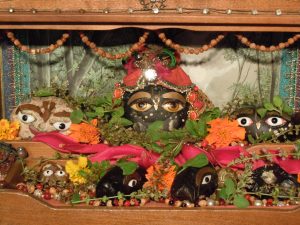
April 1 1974 Bombay-Srila Prabhupada covers a lot of important topics just in this one morning walk conversation. To think of God or Krsna at time of death is not so simple a thing. …the sraddha ceremony,and karma yoga, what is it?
.Prabhupāda: So at the time of death, when everything is disordered, nothing is in order, unless one is very strongly practiced, how he can remember?
Dr. Patel: My father spoke, “Oṁ,” and he stopped breathing and…
Prabhupāda: That’s nice. Oṁ, oṁ ity eka… That is…
Dr. Patel: Then he stopped breathing.
Prabhupāda: That means he practiced. Therefore, either you practice Oṁ or Hare Kṛṣṇa, that is all right.
Dr. Patel: Whatever we do of our whole, all our whole, all day of life, it comes at the end. That is why you must continue to do for the life.
Prabhupāda: Twenty-four hours. Kīrtanīyaḥ sadā hariḥ [Cc. Ādi 17.31]. Always Hare Kṛṣṇa Hare Kṛṣṇa Hare Kṛṣṇa… In this way practicing, if somebody is fortunate enough, he can remember.
Dr. Patel: Eṣā brāhmī sthitiḥ pārtha na… Sthitvā samanta-kāle ‘pi brahma-nirvāṇam ṛcchati.
Prabhupāda: So…
Dr. Patel: Therefore at the last moment you… But you can’t get that last moment in this position because you have, whole life, you have…
Prabhupāda: Yes, you have spoiled your life simply in material activities. How you can remember?
Dr. Patel: But even if you are doing material activities by your body, and by your mental activities you are bhaja kṛṣṇa…
Prabhupāda: But you are under the body… Prakṛteḥ kriyamāṇāni [Bg. 3.27]. Body and mind is working… Unless you practice to be above body and mind… That is bhakti-yoga. Māṁ cāvyabhicāriṇi-bhakti-yoga…, sa guṇān samatītya. You cannot expect that you go on doing all these material activities and at the time of death you’ll remember Kṛṣṇa. That is not possible.
Dr. Patel: That can’t be done.
Prabhupāda: That is not possible.
Chandobhai: Should be a real concentrated difference
Prabhupāda: Yes.
Chandobhai: When you do the work, you should be a real concentration.
Prabhupāda: That is not possible.
Chandobhai: Therefore there is no… Because your attachment is more to the…
Prabhupāda: Yes.
Chandobhai: …reserves of that…
Prabhupāda: Vīta-rāga-bhaya-krodhā man-mayā… [Bg. 4.10].
Chandobhai: Mad-bhaktaḥ.
Prabhupāda: Man-mayā mad-aśritāḥ. Unless he takes shelter of Kṛṣṇa, these things are not possible. Simply by talking it is not possible. There must be practice.
Chandobhai: Acaropanam.(?)
Prabhupāda: Yes.
Dr. Patel: (Sanskrit)
Chandobhai: Yaṁ yaṁ vāpi smaram bhāvaṁ tyajanty ante… [break]
Prabhupāda: There is a risk. Yaṁ yaṁ vāpi. If you are thinking of dog, then you become a dog.
Dr. Patel: Just as Bhārata did it.
Prabhupāda: Yes. yes, that is example. Even Bhārata Mahārāja, such a great personality, simply due to little affection to a cub of deer, he became a deer. So these people are attached to so many things. So how much risk is there at the time of death they do not understand. Therefore Kṛṣṇa says, mām ekam.
Dr. Patel: These are all, I mean, ordained to perform śraddhā, all Vaiṣṇavas.
Prabhupāda: Yes. No, Vaiṣṇavas do not do so.
Dr. Patel: We are… We, all are, all of us, are we not doing…
Prabhupāda: No.
Dr. Patel: Śraddhā ceremony…
Prabhupāda: The Vaiṣṇava, Vaiṣṇava has no duty except serving Kṛṣṇa. That’s all.
Dr. Patel: That’s right. But a Vaiṣṇava family…
Prabhupāda: No.
Chandobhai: Gṛhasthas, gṛhasthas.
Dr. Patel: Gṛhasthas.
Prabhupāda: He, whatever he may be. That is stated, that is stated that…
Dr. Patel: Only Jains can do.
Prabhupāda: That is stated that pitṛṇām. No, what is that verse? Devarṣi-bhūtāpta-nṛnam-pitṛṇām [SB 11.5.41]. We are… Just like we are indebted to our forefathers, family, similarly we are indebted to devas, the demigods. Just like the sun is supplying light. So we are indebted. Deva, ṛṣi, to the great, big, big, saintly ṛṣis. They have given us the śāstras. Devarṣi, devarṣi bhūtā… Bhūtā, ordinary living entities. Just like you are taking milk from the cows. And another, horse, is giving me service. So devarṣi-bhūtā apta, relatives. We take so much help from relatives. Devarṣi-bhūtāpta-nṛnam, ordinary human beings. Pitṛṇām. And the pitṛs. So we are debted to so many. If you want to clear up the debts, it will take millions of births. (laughter) So devarṣi-bhūtāpta-nṛnam-pitṛṇāṁ nayaṁ kiṅkara na ṛni ca rājan [SB 11.5.41]. This man is neither servant nor indebted. Who? Sarvātmanā yaḥ śaraṇaṁ mukundam. One who has taken… That Kṛṣṇa says, that “You just surrender unto Me. I will protect you.” So if he does not do anything else… One may think that he is being entangled in sinful activities because he does not do other duties. But Kṛṣṇa says, ahaṁ tvāṁ sarva-pāpebhyo mokṣayiṣyāmi [Bg. 18.66]. So one who has taken shelter, full shelter unto Kṛṣṇa, he doesn’t require to do any so-called social, political and other duties. He doesn’t require.
….Prabhupāda: Karma-yogī means one who does everything for Kṛṣṇa. He’s karma-yogī.
Guest (1): One who does everything for…?
Prabhupāda: For Kṛṣṇa.
Guest (1): For Kṛṣṇa.
Prabhupāda: Just like you are doing, doing some work. For whom you are doing?
Guest (1): For my own benefit.
Prabhupāda: That’s all. So that is karma. But when you do the same thing for Kṛṣṇa, that is karma-yoga.
Guest (1): But (Hindi), if you do it for others, for Kṛṣṇa, for Kṛṣṇa’s…
Prabhupāda: Others… Others means… That is also a humbug. You cannot do anything for others. You do everything for yourself. That is a false propaganda. You see? That is humbugism. So either you can do for yourself or for Kṛṣṇa. That’s all.
Guest (1): I see. (Gujarati)
Prabhupāda: [break] …become a slogan nowadays. Nobody does for others. “For others,” “For the poor,” these are all humbug.
Guest (1): You think people are doing something hospitals, that is for others?
Prabhupāda: Yes. That is also puṇya-karma.
Guest (1): (Hindi) Helping these temples, hospitals…?
Prabhupāda: Yes. Temple construction is different from hospital construction. That is for Kṛṣṇa.
Guest (1): But suppose somebody’s doing hospitals. Is it not for others?
Prabhupāda: Yes. But how many you can give shelter? A few. There are so many suffering people. You cannot provide hospitals for all of them. The hospitals are increasing, and the disease also increasing.
Guest (1): No, as you say that doing for others is humbug.
Prabhupāda: No, no. Humbug means he cannot do it.
Guest (1): Ācchā.
Prabhupāda: He cannot do it. He can do to his satisfaction only. That is… That is also for his satisfaction.
Guest (1): I see.
Prabhupāda: Because by opening hospital, you cannot stop disease. That is not possible. Then what you are doing for the others? That is for your satisfaction. Try to understand. Because you cannot do anything, but still, you are wasting your time. That is for your satisfaction.
Guest (1): Naturally for myself.
Prabhupāda: Yes. Hare Kṛṣṇa. You cannot do anything. The hospitals are increasing, beds are increasing, and the diseases are increasing. Then what can you do?
Guest (1): We can do our own satisfaction.
Prabhupāda: That’s all. [break] …done not meant for Kṛṣṇa, that is for his own satisfaction. Just like Arjuna wanted to become nonviolent: “No, no, Kṛṣṇa. I cannot kill my kinsmen.” That is a good proposal. But that was his satisfaction.
Guest (1): That is very correct.
Prabhupāda: Yes. That was his satisfaction. But Kṛṣṇa wanted that “You must fight.” And when he agreed to that, that is his perfection. Before that, he was trying to satisfy he.
Guest (1): Yes. When he surrendered to Kṛṣṇa, that was his…
Prabhupāda: Yes, that is the only purpose of life. Anything that is done, that is useless waste of time. Therefore Kṛṣṇa particularly said, sarva-dharmān parityajya mām ekaṁ śaraṇaṁ vra… [Bg. 18.66]. That is ekam. You try to satisfy Kṛṣṇa only. That will give you perfection. Otherwise your own satisfaction, that’s all.
Guest (1): Yes, very correct, very correct.
Prabhupāda: Whatever you do, that is your satisfaction. That is karma.
Guest (1): But not yogi.
Prabhupāda: No, karma. [break] …for your own sense satisfaction, that is karma. And if you do it for Kṛṣṇa’s satisfaction, that is karma-yoga.
Makhanlal: Pure bhakti and karma-yoga considered to be exactly the same?
Prabhupāda: Exactly the same.
Prabhupāda: Pure bhakti is above karma-yoga. Pure bhakti is above karma-yoga.
Bhāgavata: That is the difference between the Chapter Karma-yoga and Karma-yoga in Kṛṣṇa Consciousness.
Prabhupāda: Yes. Pure, pure devotion means Śravaṇaṁ kīrtanam.
Makhanlal: …you’re performing, is the vaidhī-bhakti stage of…
Prabhupāda: Yes.
Makhanlal: …of the sādhana-bhakti, the regulative principles.
Prabhupāda: Yes, vaidhī-bhakti means regulative principles, and when you are accustomed, automatically you perform, that is rāga-bhakti.
Makhanlal: So vaidhī-bhakti is considered superior to karma-yoga then.
Prabhupāda: No. Karma-yoga is better.
Makhanlal: Karma-yoga is better?
Prabhupāda: Yes.
Indian man: Pure bhakti is superior.
Prabhupāda: Pure bhakti is ṣravaṇaṁ kīrtanam. Śravaṇaṁ kīrtanaṁ viṣṇu-smaraṇaṁ pāda-sevanam, that is pure bhakti. [break]
Yaśomatīnandana: …formed by anybody.
Prabhupāda: Eh?
Yaśomatīnandana: Karma-yoga.
Prabhupāda: Unless one is inclined to take to devotion, it is not possible to take to karma-yoga. Who can sacrifice the profit?
Yaśomatīnandana: Does karma-yoga mean to follow exactly the śāstras?
Prabhupāda: Karma-yoga means yat karoṣi yaj juhoṣi kuruṣva tat mad-arpaṇam.
Yaśomatīnandana: Doing only for Kṛṣṇa.
Prabhupāda: Yes. That is karma-yoga.
Devotee: Which means?
Prabhupāda: “Whatever you do, the result give Me.”
Devotee: To Kṛṣṇa.
Prabhupāda: Yes.
Yaśomatīnandana: So we are also, those who are on the vaidhi-bhakti (indistinct) on karma-yoga path because we are…
Prabhupāda: Yes. They are acting under the order of the spiritual master. That is bhakti-yoga.
March 24 1974 Bombay
Dr. Patel: He has a very good cook. That day I don’t know how he ran away, or… You striked him, no?
Prabhupāda: No, sometimes they smoke bidis. That is the difficulty.
Indian (2): That is not in the presence of the kitchen itself, but outside.
Dr. Patel: They do all sorts of nonsense.
Prabhupāda: That is the difficulty.
Dr. Patel: If we don’t allow them, they do it.
Prabhupāda: And they will drink tea, smoke.
Dr. Patel: They always drink tea, all the cooks. They won’t like…
Prabhupāda: That is the difficulty with us. We do not want to set such bad examples. [break] …Hindu system is very hygienic. Yes.
Dr. Patel: Extremely hygienic. The W.C.’s also.
Prabhupāda: Everything.
Dr. Patel: They must be kept extremely clean or some of the diseases, you must have (indistinct)
Prabhupāda: These European, American boys, they gave up their smoking habit, drinking tea habit, all habits, meat-eating, immediately. But if we ask any Indian, he has to consider for three generations.
Note-Or they will say I must get permission from my father-which is a lie
Some Conclusions—
First off Prabhupada says if one is not cent percent pure, then he cant think of Krsna at the time of death.
…”You cannot expect that you go on doing all these material activities and at the time of death you’ll remember Kṛṣṇa. That is not possible.”
Note-But one may say I am thinking of Krsna while I am doing material activities. Here is what Prabhupada replies.
Dr. Patel: But even if you are doing material activities by your body, and by your mental activities you are bhaja kṛṣṇa…
Prabhupāda: But you are under the body… Prakṛteḥ kriyamāṇāni [Bg. 3.27]. Body and mind is working..
Prabhupada:You cannot expect that you go on doing all these material activities and at the time of death you’ll remember Kṛṣṇa. That is not possible.”
But by doing actual and real Karma yoga (which comes way before bhakti yoga) this will help one attain to this wanted goal-doing everything for Krsna-not an easy task however. We may say we are doing everything for Krsna but are we really?
BG 10.10 purport...When a person knows the goal of life but is addicted to the fruits of activities, he is acting in karma-yoga. When he knows that the goal is Kṛṣṇa, but he takes pleasure in mental speculations to understand Kṛṣṇa, he is acting in jñāna-yoga. And when he knows the goal and seeks Kṛṣṇa completely in Kṛṣṇa consciousness and devotional service, he is acting in bhakti-yoga, or buddhi-yoga, which is the complete yoga. This complete yoga is the highest perfectional stage of life.
Nov 2 1975 morning walk Nairobi
Harikeśa: So if a devotee dies and remembers Kṛṣṇa, although he is not perfect…
Prabhupāda: Unless he is perfect, he cannot remember Kṛṣṇa. That is not possible. That is not possible. That is theory only. He must be perfect. Somehow or other, he fallen, so Kṛṣṇa gives him the chance. That is special concession for devotee. Some way or other, you become devotee. Even if you cannot finish the whole job, if you fall down, still, there is guarantee that you get your birth in a very good society. That is the prerogative.”
Prabhupāda: Unless he is perfect, he cannot remember Kṛṣṇa. That is not possible. That is not possible. That is theory only. He must be perfect. Somehow or other, he fallen, so Kṛṣṇa gives him the chance. That is special concession for devotee. Some way or other, you become devotee. Even if you cannot finish the whole job, if you fall down, still, there is guarantee that you get your birth in a very good society. That is the prerogative.”
The second point that came up was Sraddha ceremony-Are the devotees required to do this?
Dr. Patel: Śraddhā ceremony…
Prabhupāda: The Vaiṣṇava, Vaiṣṇava has no duty except serving Kṛṣṇa. That’s all.
Prabhupada:..So one who has taken shelter, full shelter unto Kṛṣṇa, he doesn’t require to do any so-called social, political and other duties. He doesn’t require.
So are we fully surrendered to Krsna? If so then the sraddha ceremony is not required.
The last and third point I included as some humor about the difference between the early American/European devotees and Indians when you ask them to give up sinful things they will invariably reply (when they really dont want to do it) -”yes yes, I must ask my father first”-which is nothing more than an excuse.
So the disciples Srila Prabhupada gathered around him were in fact very sincere and serious people, otherwise how could we do all these things he asked of us?
Hare Krsna
damaghosa das
SB 3.29.8 purport...To act under the direction of a bona fide spiritual master with a motive to satisfy the Supreme Personality of Godhead is pure devotional service. But if one has a motive for personal sense gratification, his devotional service is manifested differently. Such a man may be violent, proud, envious and angry, and his interests are separate from the Lord’s.




